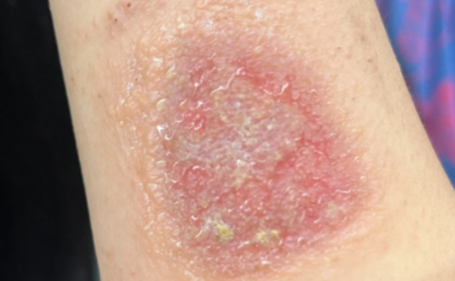The high temperature and humidity in summer provide an ideal growth environment for bacteria and fungi, which not only increases the risk of infection but may also induce or aggravate skin problems such as eczema. When eczema appears around a wound, it not only brings additional discomfort but may also affect the healing process of the wound. Here are some tips for summer wound care. Follow me to take a look.

What is the main reason for the high incidence of eczema in summer?
1. Due to the high temperature and humidity in summer, the skin barrier is easily damaged and cannot effectively block various external stimuli.
2. Failure to change wound dressings frequently in the high temperature of summer causes the skin's stratum corneum to become soaked and swollen, the sweat ducts to become blocked, and excretion to become poor, which in turn causes eczema.
3. In summer, people like to pursue cold or irritating foods such as crayfish, skewers, etc., which can easily damage the spleen and stomach functions. When the spleen cannot function normally, dampness is generated internally, to a recurrence of eczema.
Treatment principles for eczema
Eczema is generally divided into three stages: acute, subacute, and chronic, and different treatment principles are used according to the characteristics of different stages.
1. Acute treatment :
To protect skin lesions, avoid external stimulation, promote keratin regeneration, and eliminate residual inflammation;
2. Subacute eczema :
For anti-inflammatory, antipruritic, drying, and astringent effects, zinc oxide oil, zinc oxide paste, mud cream, or emulsion may be appropriately selected.
3. Chronic eczema :
It can relieve itching, inhibit the proliferation of epidermal cells, and promote the infiltration and absorption of dermal inflammation. Ointments, emulsions, and mud pastes are suitable.
In addition, the course of eczema is closely related to diet, and it is necessary to abstain from spicy and irritating foods such as peppers, fish and crabs, strong tea, coffee, etc.
In addition, observe for two or three days after consuming milk, dried fruits, etc. If eczema worsens, stop consuming them immediately.
wound care recommendations:
1. Remember to change wound dressings frequently, and let the wound skin air dry for a while when changing the dressings.
2. Avoid using antiperspirants, as the active ingredients in antiperspirants may irritate sensitive skin and increase the risk of wound skin allergies.
3. Do not scratch it with your hands as this may spread the infection.
4. If the skin around the wound develops a butterfly-like shape, accompanied by itching and scaling, or serious symptoms such as joint pain, fever, pneumonia, etc. appear, you should seek medical attention immediately for examination and treatment.

Eczema around wounds in summer requires comprehensive management, including keeping the wound clean and dry, using medications appropriately, avoiding irritation and scratching, moisturizing and barrier repair, adjusting lifestyle habits, sun protection, timely medical treatment, and psychological adjustment. Through these measures, eczema symptoms can be effectively controlled and wound healing can be promoted. Remember, proper care and timely medical intervention are the key to wound care in summer.
For more information on Innomed® Alginate Dressing, Refer to the Previous Articles. If you have customized needs, you are welcome to contact us; You Wholeheartedly. At longterm medical, we transform this data by Innovating and Developing Products that Make Life easier for those who need loving care.
Editor: kiki Jia

 English
English عربى
عربى Español
Español русский
русский 中文简体
中文简体








